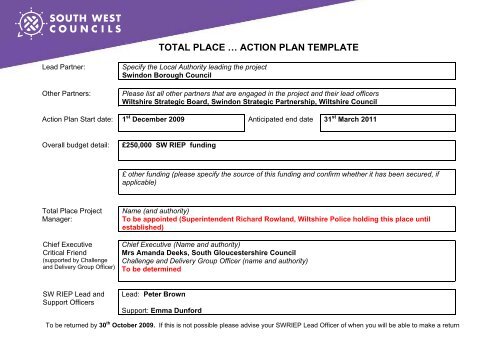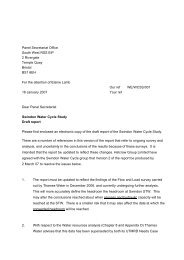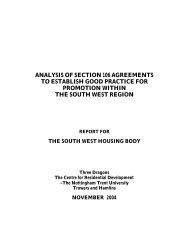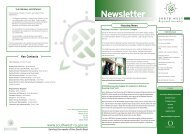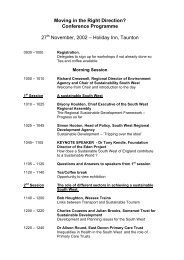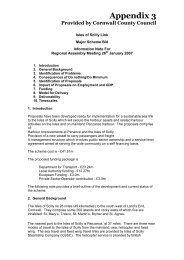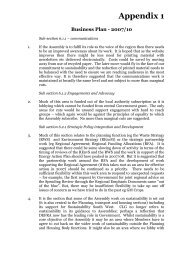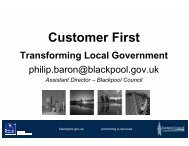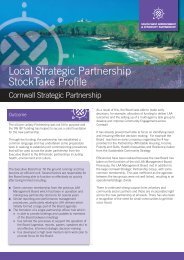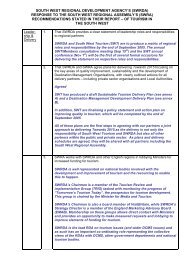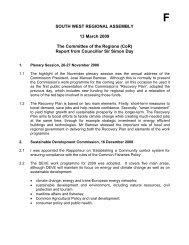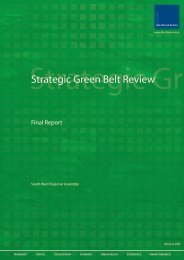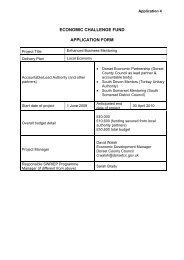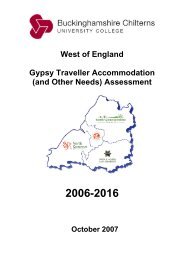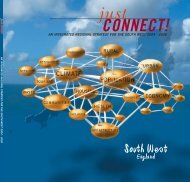TOTAL PLACE ⦠ACTION PLAN TEMPLATE - South West Councils
TOTAL PLACE ⦠ACTION PLAN TEMPLATE - South West Councils
TOTAL PLACE ⦠ACTION PLAN TEMPLATE - South West Councils
Create successful ePaper yourself
Turn your PDF publications into a flip-book with our unique Google optimized e-Paper software.
SOUTH WEST<br />
<strong>TOTAL</strong> <strong>PLACE</strong> … <strong>ACTION</strong> <strong>PLAN</strong> <strong>TEMPLATE</strong><br />
Lead Partner:<br />
Other Partners:<br />
Specify the Local Authority leading the project<br />
Swindon Borough Council<br />
Please list all other partners that are engaged in the project and their lead officers<br />
Wiltshire Strategic Board, Swindon Strategic Partnership, Wiltshire Council<br />
Action Plan Start date: 1 st December 2009 Anticipated end date 31 st March 2011<br />
Overall budget detail:<br />
£250,000 SW RIEP funding<br />
£ other funding (please specify the source of this funding and confirm whether it has been secured, if<br />
applicable)<br />
Total Place Project<br />
Manager:<br />
Chief Executive<br />
Critical Friend<br />
(supported by Challenge<br />
and Delivery Group Officer)<br />
Name (and authority)<br />
To be appointed (Superintendent Richard Rowland, Wiltshire Police holding this place until<br />
established)<br />
Chief Executive (Name and authority)<br />
Mrs Amanda Deeks, <strong>South</strong> Gloucestershire Council<br />
Challenge and Delivery Group Officer (name and authority)<br />
To be determined<br />
SW RIEP Lead and<br />
Support Officers<br />
Lead: Peter Brown<br />
Support: Emma Dunford<br />
To be returned by 30 th October 2009. If this is not possible please advise your SWRIEP Lead Officer of when you will be able to make a return
Section A: Summary<br />
Please provide a brief summary of your Action Plan proposal.<br />
Our shared mission will be:<br />
“To create and sustain an environment in which people can be physically and emotionally healthy. Our work will be to<br />
remove obstacles in the path of physical, intellectual, emotional and creative human wellbeing. Our aim will be to do this<br />
with the active participation of individuals within our communities, and with the communities themselves, both in the<br />
design and delivery of solutions”.<br />
We have placed our work with people, and importantly their place within families and their local communities, at the<br />
heart of our programme. We intend for our approach to act as a catalyst to bring about the systemic and cultural change<br />
that will be required to align local services to this mission, and so help create communities where everyone has the<br />
opportunity to reach their potential.<br />
Four neighbourhoods, each with a historically high demand upon public services, will be identified (two for Wiltshire<br />
and two for Swindon). All four will be the subject of a thorough and wide ranging analysis of known data sources to<br />
determine the issues prevalent within them, and the cost of the services provided (deep-dive). Opportunities will be<br />
sought from this exercise to gain insight into joint intelligence handling, analysis and knowledge management. This will<br />
establish a base line from which changes can be tracked over the duration of this programme.<br />
Two of the areas will become control sites for the study, one each for Wiltshire and Swindon, and the other two will<br />
designated as trial areas for a transformational redesign of the services provided there.<br />
A major public engagement exercise will be undertaken within the two trial areas, providing an opportunity to pilot new<br />
approaches to joint consultation and engagement, and to learn from this. This work will establish, in some detail, the<br />
issues affecting these communities as a whole and how their needs may be better met in line with our mission.<br />
With this information, and building upon the innovative approach taken by the Swindon Family LIFE Programme, we will<br />
seek to work with families who are in chronic crisis from each of these two trial areas. This approach will be one of<br />
‘invitation’ rather than compulsion. It will be one of helping family members gain competence and meaning in their lives,<br />
so gaining the skills to pull themselves out of dependency, achieve their potentials and become self-sufficient.<br />
Wider engagement with neighbours, and the community as a whole, will provide opportunities to co-create futures by<br />
being open minded and prepared to try something different. In getting to solutions it will be necessary to let go of our<br />
preconceptions, to be truly open to seeing the current reality and to be prepared to let the families themselves guide the
way forward, often in ways we cannot imagine or take ‘off the shelf’.<br />
Frontline service providers, the community, members of the voluntary sector and most importantly members of the<br />
families themselves will be engaged in:<br />
developing new supportive relationships between partner agencies as well as within families and their wider<br />
networks<br />
providing new resources designed to improve the ability of family members to gain a sense of competence and<br />
meaning in their lives<br />
discover opportunities for greater connection between families and the wider community and so build sustainable<br />
supportive networks<br />
identify effective means to deliver additional support that can be provided for specific needs, for instance the<br />
treatment of depression, anxiety, addiction and other mental illnesses prevalent within society as a whole<br />
throughout the programme ensure that approaches are scalable to the whole community, challenging and<br />
changing existing systems so that they support a new way of working so that needs are met proportionately.<br />
take every opportunity for the approach to become a source of personal learning within our organisations for how<br />
we should live our own lives and relate to others<br />
An important benefit from this approach will be to understand the organisational impact of working in a different way.<br />
We expect that the approach will change the way we develop our staff, the expectations we have of each other and the<br />
nature of the ‘soft’ skills should we equip ourselves with. A significant challenge for leaders will be to create and<br />
incubate an environment that allows this to grow organically for the benefit of all.<br />
We anticipate real, whole system change, so we will almost certainly be seeking to negotiate freedoms and flexibilities to<br />
try innovative ways of working. For instance the Swindon Family Life programme has already sought and received<br />
support to try a different approach which contrasts to a significant degree with the established family intervention<br />
programme.
Section B: Action Plan Detail<br />
Scope of Proposal:<br />
What is the Focus of your Total Place approach?<br />
Families lie at the heart of our communities and for the most part have mutual support networks that minimise their<br />
demand upon service providers. However, some families find themselves in a condition of ‘chronic crisis’ having a<br />
complex set of risk factors and characteristics that has resulted in a high dependency upon government interventions<br />
and finance. Our focus will be to redesign our combined service provision in order to work with families to help them<br />
achieve the skills and competencies to lift themselves out of dependency and into self-sufficiency and wellbeing. This<br />
will include looking at how neighbours and the wider community can provide support, rather than isolate them.<br />
What issues, problems or opportunities are you seeking to address?<br />
The Swindon Family Life Project has found that families in crisis are likely to be interacting with multiple agencies<br />
over long periods of time. These agencies have very different approaches driven by their own culture, objectives<br />
and targets, and often conflict. A family already in crisis will find this unhelpful and confusing, resulting in a<br />
resistance, as well as an inability, to change.<br />
The individuals and families with which our services currently interact are most likely to have been in chronic<br />
crisis for many years, if not generations. To break this cycle our whole effort has to be aligned with our mission to<br />
remove obstacles at every level, thus constructing genuinely effective recuperative opportunities and a<br />
sustainable universal preventative environment.<br />
This programme provides an opportunity to provide effective and supportive interventions, from a single joint<br />
source, with a common mission, to remove the obstacles to wellbeing.<br />
Identify how other RIEP programmes could assist your Total Place proposal.<br />
Practice will be shared using the network of Total Place initiatives.<br />
Outputs:<br />
What outputs will be delivered by Total Place additional to those already identified?<br />
Develop a model of costs and a baseline for this for each participating family<br />
Develop a system of measuring outcomes for each participating family<br />
Establish a system of measuring outcomes for the wider community<br />
Establish the business benefits of each of the programmes<br />
Redefined and co-designed joint services<br />
The identification of efficiencies as services are redesigned
New approach to communicating with and training staff across agencies<br />
Mechanisms for organisational learning across partners<br />
Mechanisms for the sharing and analysis of knowledge and intelligence<br />
Mechanisms for the joint consultation and engagement of the public<br />
A tactical menu of options that are proven to deliver demonstrable benefits with detail of the associated tool sets for<br />
their delivery<br />
Key milestones:<br />
Please specify the key milestones for your Action Plan (including dates).<br />
The following milestones are provided as an indication of the way ahead although our approach will be one of learning<br />
by doing, being flexible and not necessarily detailed advance planning:<br />
Analysis of trial and control sites commenced<br />
Outline programme plan agreed<br />
Programme team established<br />
Detailed programme plan designed and agreed<br />
Public consultation and engagement commenced<br />
Performance and learning framework established<br />
Services redesigned<br />
Resources identified and trained for redesigned service<br />
Monitoring of project and final report<br />
Opportunities for cultural and systemic changes to support new way of working identified<br />
New ways of working throughout organisations implemented<br />
Criteria and Process (according to the Framework for <strong>South</strong> <strong>West</strong> Total Place)<br />
Transformation<br />
How will the project deliver real business transformation in service delivery across public service agencies?<br />
The approach we will take is based upon early evidence from a pilot project in Swindon and will be aligned to our<br />
mission. It is intended from the start to break existing mindsets and create a clear vision of what we are really about. If<br />
we all have a similar intention (very simply - to remove obstacles to wellbeing and thereby reduce dependency), and all<br />
of our systems, processes, policies, and actions are aligned to this, we will start to make very different decisions, both<br />
collectively and individually. Many have yet to be imagined but they may include:
Families identifying their own needs and working with services to help them build their own capacities.<br />
Members of communities deciding to assist families in their desire to change, by action to support rather than to<br />
undermine.<br />
A GP able to refer a person struggling with depression to a service that will be able take a holistic view of their<br />
situation – helping the person to fix relationships, financial advice, parenting, nutrition etc as opposed to only<br />
realistically having recourse to prescribing an anti-depressant. The avoidance of potential chronic crisis in the<br />
future should make this very cost effective as the intervention is likely to be light touch in the first instance.<br />
Head teachers may seek the wellbeing of young people as the highest priority equipping them with the skills to<br />
fulfil their emotional needs - followed a close second by educational attainment. This should have minimal cost if<br />
built into the curriculum.<br />
Agencies viewing people in crisis as needing help rather than being the problem, for instance, a police officer<br />
recognising a family approaching crisis offering support and/or taking a restorative approach rather than seeking<br />
to satisfy detection rate targets.<br />
A nurse or doctor considering the whole person and not just the presenting condition and acting to improve<br />
general wellbeing, with others as necessary.<br />
Agencies may be less reluctant to share information and intelligence if it is understood that it will be used for the<br />
common purpose of improving wellbeing. Early and appropriate interventions may well save lives and will<br />
certainly improve them.<br />
Working with individuals in the context of improving situations for the communities in which they live and thereby<br />
increasing public confidence and local engagement in problem resolution.<br />
Enabling people to develop employment skills rather than be dependent upon benefits<br />
From the outset we will need to be mindful that whilst early and effective intervention will save considerable costs in the<br />
future, our learning must include how our redesigned services will scale, replicate and be sustainable.<br />
Value for Money<br />
How will Total Place deliver better value for money?<br />
Our aim will be to share and redirect existing resources to redesigned joint services wherever possible.<br />
The cost of a family in chronic crisis has been estimated to be £250,000 pa. The following are just a few of the financial<br />
benefits of reducing chronic crisis within families:<br />
For each child not taken into care there would be a saving of around £34k pa
Reduction of an adult’s needs from acute to average would save £20k pa<br />
Reduction of criminal behaviour from acute to average by each individual £2,815 pa<br />
Savings from avoiding unemployment £40k pa<br />
For each child not excluded from school £18k pa<br />
We also expect there to be significant associated benefits in creating a stronger sense of community and reduced antisocial<br />
behaviour.<br />
Our approach will be to identify and stop work that does not directly or indirectly align with our mission.<br />
We will seek ways to share functions where practicable<br />
We will reduce bureaucracy to only that required to align with mission<br />
List any identified efficiency savings and/or cashable benefits which will be sustainable year on year and are additional to those<br />
already planned as part of NI179 targets.<br />
Barriers<br />
What barriers have been identified to delivering this business transformation and how will these be overcome?<br />
<br />
<br />
<br />
<br />
Organisational inertia. This will be overcome through positive leadership and by taking a collaborative approach,<br />
engaging with staff at all levels throughout the programme<br />
It is possible that elements of this approach will conflict with existing statutory obligations, governmental targets<br />
and strategy. We will seek to negotiate freedoms and flexibilities as appropriate<br />
Budgets and resource allocation. Focus on new ways of working rather than ‘new’ resource. Preparedness to stop<br />
doing that which is not aligned with mission and remove systemic barriers to allow greater contact with people in<br />
need.<br />
Significant changes in working practice will need the best people working in new ways. Remaining staff will need<br />
good leadership during the transition period. Starting with small pockets of activity will promote organic growth.<br />
Outcomes<br />
What will be the improved outcomes for Service users?<br />
Improved emotional wellbeing<br />
Reduced dependency upon public services and finance<br />
Improved general health
Reduced likelihood of criminal sanctions<br />
Reduced anti-social behaviour in neighbourhoods<br />
Improved sense of community<br />
Increased confidence in the capability of public services to deliver sustainable solutions<br />
A shared understanding and responsibility between communities and local services<br />
Prevention<br />
Identify how your transformation proposals address dependency and prevention agendas in the area, working with other<br />
agencies?<br />
This project is aimed at working in a different way with families to reduce their dependency on services and to enable<br />
them to make sustainable and radical change in their lives. It is also about prevention and independence and will impact<br />
on all services working with such families. This will enable us to begin to re-focus resources upon preventing people<br />
falling into chronic crisis in the first place, rather than spend everything on those already in crisis. We must stop acting<br />
in ways which do not deliver improved wellbeing.<br />
Deep Dive<br />
Which service area are you proposing for a ‘deep dive’ and how will this be done?<br />
Our ‘deep dive’ will be both geographic and thematic. A thorough collection of data and its subsequent analysis will be<br />
undertaken for the four identified areas. Two of these will then be subject of a thorough collaborative enquiry approach<br />
to determine the issues most affecting people. From this information we will identify the expenditure of services and<br />
seek opportunities to reduce duplication and share learning.<br />
Scalability/repeatability:<br />
How will lessons learnt be recorded and how will they be shared with other LAs/Public Bodies in the <strong>South</strong> <strong>West</strong>?<br />
Building upon the practice adopted by Total Place we will seek to record lessons in ways that are appropriate to the<br />
requirements of various interested groups. This is likely to include learning histories, use of video and other methods as<br />
appropriate.<br />
Section C: Resources and Governance<br />
Summary of Costs:<br />
Please detail revenue and capital expenditure involved in delivering Total Place which should correlate with the overall budget
summary.<br />
Capital costs £50,000 (20% of overall grant as directed). Use yet to be determined but to be available to further this<br />
programme as required.<br />
Analysis and evaluation costs: approx £30,000<br />
Communications: approx £20,000<br />
Project Management and Change Management: £150,000 to allow for the employment of additional project<br />
leadership for Wiltshire, Swindon and project co-ordination between the two areas.<br />
Section D: Risk Assessment<br />
Please specify key risk areas and how they will be mitigated, including dependency on other projects, resource, implementation<br />
risks, technology risks, governance risks etc.<br />
i) Commitment to programme - leadership group to engage with staff and encourage community leaders<br />
ii) Change of Chief Executive for Wiltshire – thorough briefing by outgoing Chief Executive and team<br />
iii) Change of government or political direction – leadership to seek continued support on the basis of early<br />
evidence of success<br />
iv) Future financial constraints – project to ensure each element is able to scale in the future within existing or<br />
reducing overall resource, interim report required by May/June 2010 to allow budget build for 2011/12
proof of concept<br />
two trial sites<br />
two control sites<br />
define<br />
mission<br />
describe<br />
tools<br />
explore<br />
context<br />
situational<br />
analysis<br />
refine<br />
diagnosis<br />
treatment<br />
plan<br />
performance<br />
framework<br />
delivery<br />
phases<br />
monitor<br />
& report<br />
Underpinning Theory<br />
Applied Hypothesis<br />
incorporated<br />
consultation<br />
insights<br />
Capability Build<br />
Evaluation<br />
Challenge<br />
Analysis<br />
distil guidance<br />
define policy<br />
refine strategy
Participle Approach (from website and as applied within the Swindon LIFE Project – included as an illustration only))<br />
We tend to run two different types of projects - 18 month long projects, which involve developing deep and broad analysis in a subject area, or 9<br />
month projects that use existing knowledge and experience in a more focused manner. Different situations demand different approaches.<br />
All our projects are run by a Project Entrepreneur, specifically hired for any given project. The Project Entrepreneur will run the project, as well as<br />
plan to run the service as an enterprise after the project has finished. They will be supported by inter-disciplinary experts from our team and Associates<br />
to ensure the project can draw on the necessary skills, combining local and external knowledge.<br />
In our experience, every time we develop a project, our process needs to be slightly tailored. However, all processes typically run over five stages.<br />
1. Scoping - The scoping stage starts with an examination of the environments we will be working within, with a specific view to evaluating the<br />
ability to adapt and change. We will examine the marketplace, the key organisations, the key experts, the physical locations and existing<br />
services, as well as building a unique approach to understanding the end users. We typically start with a key question. This might be broad, like<br />
‘How can we enhance youth-adult relationships?’, or more focused like ‘Why are there so many socially isolated individuals in a specific<br />
area?’ We will examine the question as a starting point, exploring the issues around it, and examine the problems and the blocks. Through this<br />
process we will refine the general question to one that can be solved. These enquiries will develop the foundation stone of our project. The<br />
result will be a robust project hypothesis, for example - ‘Working with the personal motivations of isolated older people and nurturing<br />
relationships will lead to increased participation in the community.’<br />
2. Research - At the heart of our approach, Participle captures and uses the expert views of end users. We tend to carry out two strands of<br />
research. First, we carry out direct user research. Designers are very good at capturing the rational and emotional balance of life. We use<br />
bespoke user research techniques that range from deep involvement (eg. living with individuals for long periods of time), using tools that<br />
enable individuals to capture their lives (eg. innovative diary, lifestyle and social network capturing techniques), group work (eg. empowering<br />
disengaged young men to make their own film), to rapidly experimenting with some potential solutions (eg. if you become an older person’s<br />
chauffeur for a week, what changes, what do you learn?) to name just a few. We develop new approaches for all our projects. Second, we carry<br />
out indirect research. This can involve observations of people and places, relevant literature reviews, a policy review, a look at innovations in<br />
this area, as well as both an organisational and business examination of the delivery of existing services. Simultaneously we begin the ‘top<br />
down’ part of the process, looking at the economics of service provision, institutional incentives, experience from other parts of the country and<br />
the world.<br />
3. Idea Generation - In this stage, we narrow things down and a series of service solution ideas around a particular avenue are explored. A<br />
number of solutions and elements of an emerging new public service concept are quickly visualised and discussed from all the insights<br />
gathered in the research stage.<br />
4. Prototyping - This stage looks to build the different elements of the new service idea, with a view to re-introducing the end user and frontline<br />
staff to gain feedback. The concepts are developed into stories and scenarios that are then rapidly tested with target users and front-line service
providers, the existing concepts will be challenged and are developed into more detailed workable propositions. The prototype is then ‘mockedup’<br />
into believable service components or products, or instructions for new ways of doing things. This may include online, telephone, or people<br />
delivered elements. We develop the service well enough for the users to ‘believe in’ and experience it. Again, this is trialed with real users, who<br />
feed back allowing an iterative process of improvement and refinement to the proposition. This continual refinement through user feedback is<br />
key to producing usable quality products and services, and is fundamentally different from a pilot project in which the emphasis would be on<br />
measuring effectiveness of a pre-designed service. At the same time, at this stage we develop an actual business plan, a document that makes<br />
sure our solutions are affordable, desirable and work in practice. We ask fundamental questions such as - How will it be funded? Who will run<br />
it?<br />
5. Delivery - At this point we review what is likely to be launched at the end of the project. This can vary, but we usually launch a new social<br />
enterprises around the new service idea. This new enterprise needs to be developed as a business, including all planning processes, financing<br />
structures, piloting and testing the service, before it is launched as a fully operational service.


